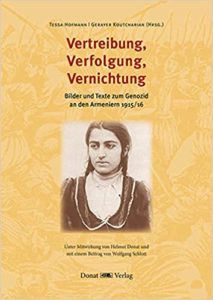
Helmut Donat
Celebrating German Publisher, Human Rights Activist Helmut Donat on His 75th Birthday
by Muriel Mirak-Weissbach
BREMEN, Germany, APRIL 7, 2022 – It is not only his family and friends who have reason to congratulate Helmut Donat on his 75th birthday; members of the Armenian community everywhere should join in as well. As a publisher, he has done more to educate the reading public on Armenia, its people and history, its tragedies and achievements, than any other German publisher. In her birthday greetings (printed below) his long-standing friend and colleague, the well-known genocide scholar and human rights advocate Tessa Hofmann references a few of the many books he has produced, which cover a wide range of topics and genres, reaching back in time to before the first World War.
The list of valuable resources he has made available includes works examining the role of Imperial Germany: In 2004 his publishing house Donat-Verlag presented the account of the genocide written by Heinrich Vierbücher, Armenia 1915: What the German Imperial Government Concealed from Its Subjects. Then came Armenia, Turkey and the Duties of Europe by Eduard Bernstein and Otto Umfrid (2005). The Slaughter of a Civilized People at the Hands of the Turks, Two War Years in Constantinople 1915-1916 by German newspaper correspondent Harry Stürmer appeared in 2015. In the year of the centenary of the genocide, Donat-Verlag also released the definitive biography of Walter Rößler (1871-1929) by Kai Seyffarth. Rößler was a German consul in Aleppo, who displayed extraordinary courage in exposing the genocide as it unfolded, in hopes of influencing German policy to end the atrocities. And Yetvart Ficiciyan revealed what the public could read in The Armenian Genocide as Reflected in the German Language Daily Press 1912-1922. Among works documenting its horrors is Expulsion, Persecution, Extermination, an album of photographs and texts associated with a permanent exhibition by Tessa Hofmann, in collaboration with Gerayer Koutcharian and Wolfgang Schlott.
In making such books available to the German public, Donat has performed the role of educator. And, most important, he has joined other scholars and human rights advocates like Hofmann, as an indefatigable campaigner for the recognition of the genocide by the German political establishment. Publishing, for Helmut Donat, is not a commercial enterprise but a vocation; he produces books and wields them like weapons in a campaign for historical justice.
Discovering the Armenians
Who is Helmut Donat? And how did he come to devote his energies to Armenian issues? He was born in Lower Saxony in the immediate post-war period, in a family of refugees. He trained for a career in the banking sector before returning to complete his secondary education, then pursued university studies in Braunschweig to become a teacher. From 1975 to 1981 he worked as an academic tutor and lecturer at the Bremen university, where he had settled. In 1981, Donat published his first work, a book on a naval officer named Hans Paasche. Born in 1881, Paasche had opposed the cult of violence developed in Germany and was killed in 1920 by radical rightwing soldiers. Not having found any publisher, Donat decided to put out the book on his own. In 1984, he set up a publishing house together with Horst Temmen, the Donat & Temmen Verlag. Four years later, the two parted ways, and continued independently. Donat-Verlag in Bremen has since come to occupy a special place in German publishing.
His first contact with Armenia goes back to his early years. He told the fascinating story in a speech delivered on April 9, 2010:
“Almost no other population has accumulated so much suffering in the course of its history. It has consistently been a pawn of the Great Powers. Byzantines and Persians, Arabs and Turks have in turn subjugated and mistreated it. That the Armenians however have not perished, but rather have survived and have preserved their cultural identity, bears testimony to a robust resilience to be found in almost no other people.
“I first heard about Armenia when I was a pupil. I was 12 or 13 years old, when my geography teacher declared that Ararat was the highest mountain in the Caucasus and that German soldiers had fought there in the Second World War. Then he said, ‘A Jew can swindle ten Arabs, but an Armenian can swindle ten Jews.’ That was it. Nothing about the culture, the landscape, or at all about the genocide. So, the cloak of silence that the German Imperial government had once spread over the Armenian people, in order not to incriminate its Turkish ally, continued to exist long after the Second World War.
“The Armenian people represent one of the oldest Christian cultures,” he began.
“Almost no other population has accumulated so much suffering in the course of its history. It has consistently been a pawn of the Great Powers. Byzantines and Persians, Arabs and Turks have in turn subjugated and mistreated it. That the Armenians however have not perished, but rather have survived and have preserved their cultural identity, bears testimony to a robust resilience to be found in almost no other people.
“I first heard about Armenia when I was a pupil. I was 12 or 13 years old, when my geography teacher declared that Ararat was the highest mountain in the Caucasus and that German soldiers had fought there in the Second World War. Then he said, ‘A Jew can swindle ten Arabs, but an Armenian can swindle ten Jews.’ That was it. Nothing about the culture, the landscape, or at all about the genocide. So, the cloak of silence that the German Imperial government had once spread over the Armenian people, in order not to incriminate its Turkish ally, continued to exist long after the Second World War.

Cover of a book on the Armenian Genocide, published by Donat
“It took another 20 years before I was to hear anything about Armenia again. At the time I was collaborating on a manuscript of the Bremen pacifist Ludwig Quidde, edited by Karl Holl, titled, The History of German Pacifism during the First World War. One of my tasks was to clarify facts that the contemporary reader might not be familiar with. For example, in November 1915 the General Meeting of the German Peace Society ‘expressed its sympathies for all oppressed and mistreated peoples, in particular the Armenians and Russian Jews.’ It was not clear to me what this meant, and all I could remember was what my geography teacher had said. So, I started to do some research – and was confronted with terrible events. It was not on the slaughter fields of Verdun that the bloodiest chapter of the First World War had been written, but ‘down in Turkey, far away.’ In an extremely cruel manner, over one million Armenians were tortured to death in 1915/16; they were victims of an organized extermination and systematic killing. I was 30 years old at the time, but neither in school nor anywhere else had I ever heard anything about the first genocide of the 20th century. I felt misled, was outraged, swore to myself that I would do something about it, and began to inform myself, rummaged about in second-hand book stores, read old newspapers, found collections of documents and set up an ‘Armenian section’ in my library. When a couple of years later I began to publish books, they soon included works, pamphlets and writings on Armenia. Likewise, many others have contributed to breaking through the continuing taboo.”
Donat told this story 12 years ago to a gathering at a cultural event in a suburb of Bremen, an “Armenian Evening.” He entitled his speech, “Wounds from the Past – Impact on the Future.” After sharing his own experience, he turned to the political reality of the day, issuing sharp criticism of the German government for kowtowing to Turkish government sensitivities, and refusing to recognize the genocide.
“In the Federal Republic of Germany,” he went on, “there are about 42,000 Armenians. They should know that we extend our hand to them and stand by them whenever — from whatever quarters — the attempt is made to confuse public opinion and blame their grandfathers and great-grandfathers for the crimes committed against their people. And they should know that we do not stand in the tradition of those Germans who, out of loyalty to their Turkish allies, have betrayed truth and justice and have stifled freedom of opinion. In this sense,” he explained, “the ‘Armenian Evening’ aims at recalling what happened and what must never happen again, and at the same time making clear that forgetting, silence and indifference – today as in the past – are accessories to crimes.”
For Helmut Donat, such an “Armenian Evening” was a means of assisting Armenia and its people in building their future. “And we can help out even just by becoming acquainted with their great heritage of literature, music, poetry and culture, with the Armenian people…” Over the decades, Donat has contributed significantly to acquainting Germans with this heritage, by organizing such cultural events, like the Armenian Cultural weeks in Bremen, but, especially, by publishing works on Armenia’s history, politics and rich culture. He has received numerous awards for his achievements. In April 1990, he was given the Bremen Villa Ichon’s Peace and Culture Prize in recognition of his editorial achievements “which demonstrate a commitment to peace on a high cultural level.” In May 1996, he got the Carl von Ossietzky Prize for Contemporary History and Politics. By spring 2007, his publishing house had produced over 300 books on contemporary history, with the primary focus on the peace movement, Nazism, the Armenian genocide, pacifism and the history of militarism, especially in Germany. Since then, the list of publications has continued to grow in quantity, quality and impact.
And, although he has reached an age at which many people retire into private life and tend their gardens, it is to be hoped and expected that Helmut Donat will preserve his energy and determination, to continue producing meaningful, beautiful books.

Genocide Poets
by Tessa Hofmann
Herzlichen Glückwünsch zum Geburtstag! or: Congratulations on Your Birthday!
Tessa Hofmann
The Bremen publisher Helmut Donat is celebrating his 75th birthday. And the Working Group Recognition – Against Genocide, for International Understanding (AGA) e.V. says thank you wholeheartedly: Thank You, dear Helmut, for having worked towards human rights, peace and justice as a publisher for 40 years. Your commitment as a publisher for and with Armenians stems from your pacifist orientation. You have recognized that wars — including civil wars — are among those constellations that promote genocide and other atrocities. This was the case in World War I in the Ottoman Empire as well as in World War II in Nazi-occupied Europe.
You have reissued classics of German-language documentary works on the extermination of Ottoman Armenians, especially the correspondence of the German Foreign Office published by Johannes Lepsius under the title “Germany and Armenia” in 1919 (reprint 1986), but also documentation of current violence against Armenians, including the one published in 1989 by the Armenische Kolonie zu Berlin e.V., the Armenian Apostolic Church Community of Berlin, and the Federation of Armenian Associations in the German-Speaking World, “Tanks against Perestroika: Documentation on the Conflict in and around Artsakh (Karabakh).” This work, published shortly before the beginning of the First Karabakh War (December 1991 – May 1994), helped many Germans to understand the struggle for freedom and the independence movement of the Armenian region of Artsakh, which was forcibly annexed to Azerbaijan by the Soviet regime in 1920.
Today we are one Karabakh war (autumn 2020) further, but still no closer to the realization of the right to self-determination in Artsakh. And it seems that in the shadow of the Ukraine War, which is occupying the attention of Europe almost completely, war and acts of violence in the South Caucasus are being once again “ignored.”
With your engagement, dear Helmut, you have actively and effectively supported the movement for genocide ‘recognition’ launched by the Armenian community in Germany as well as human rights organizations working here. We know of no other publishing house – even by comparison on the international stage – that has published as many books on the Armenian Genocide as yours; the following publications are currently available from Donat Verlag: http://www.donat-verlag.de/buch-kategorie.php?id=13
That the German Bundestag (Parliament) in June 2016 finally recognized the historical fact of the Ottoman genocide against about three million Christians before, after and especially during the First World War, is therefore also thanks to you. Some matters, unfortunately, take a long time. We, the Working Group on Recognition, submitted the first petition for parliamentary recognition to the Petitions Committee of the German Bundestag as early as April 2000.
As a historian, you are familiar with the staying power of history, the slowness and obduracy of politicians, but also the power of perseverance. On your birthday, you can look back on many achievements that are due to your perseverance and principledness. But at the same time, unfortunately, we still face many unresolved issues. Nationalism and militarism are again threatening peaceful coexistence. Our wish for your birthday is therefore also to know that you will continue to be healthy and strong at our side, and to be able to leaf through the latest books of your publishing house, which, as always, you will print with attention and loving care.
Let us celebrate you today, our dear Helmut!